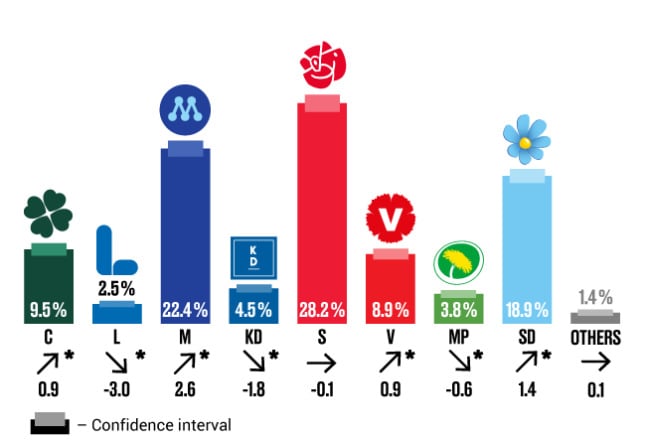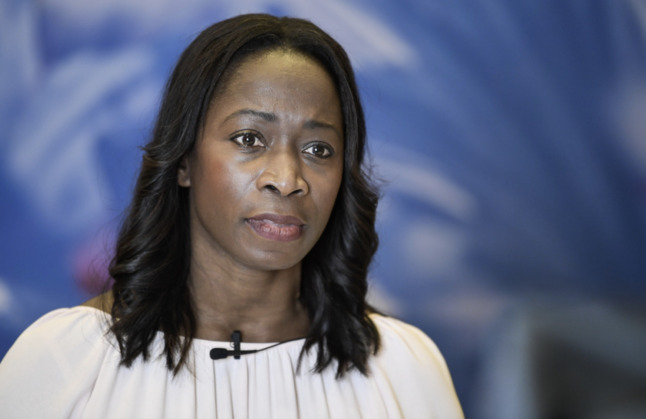The survey, published on Wednesday by Statistics Sweden, estimates that the governing centre-left Social Democrats would still win the largest share of the votes, with the conservative Moderate Party coming second, and the anti-immigration Sweden Democrats third.
The minority Liberal Party suffered an overall decrease of 3 percentage points compared to Sweden’s last election in 2018. The survey estimates that 0.5 percent of voters would switch from the Liberals to the Centre Party.
Nicholas Aylott, associate professor of political science at Södertörn University, told The Local: “The Liberals are suffering because the party is split along the new fault line of Swedish politics which is the question of immigration and integration and relations with the Sweden Democrats.”
“If a party finds itself evenly split on such a central question, one that stirs up so much sensitivity on both sides, then it’s likely to be in trouble,” he said.
Liberal leaders recently voted to stop propping up the country’s red-green coalition government and campaign alongside the right-wing Moderate party in the run-up to next year’s September general election.
“This manoeuvre seems to have had no pay off at all or been swamped by its costs,” Aylott said.
“The party is in big trouble, there’s no doubt about that.”
Because of Sweden’s political model, one of the larger parties would need the support of smaller parties in order to form a government. But the threshold for getting a seat in parliament is 4 percent – a threshold the Liberals and the Greens are currently at risk of not making. If only one of them gets in, it could tip the election either in favour of the left (if the Greens get in, but the Liberals do not) or the right (vice versa).
According to this latest poll, the Greens are only missing the 0.2 percent needed to make that threshold, while the Liberals would need gains of 1.5 percentage points.

Estimate of election results “if an election had been held today” May 2021, and the difference compared with the 2018 parliamentary election. From left: Centre Party (C), Liberal Party (L), Moderate Party (M), Christian Democrats (KD), Social Democratic Party (S), Left Party (V), Green Party (MP), Sweden Democrats (SD). The asterisk means the change is statistically significant. Data and graph: Statistics Sweden
The results did not differ significantly from the last survey conducted by Statistics Sweden in November 2020. After significant losses at the end of 2020, the governing Social Democrats have maintained the same points.
“There are signs of politics getting back to normal to some extent after the pandemic,” according to Aylott.
He said that the return of criminality, violence and instability to front pages could favour parties of the right or that the return to a pre-pandemic “normal” would benefit incumbent parties of the status quo.
Compared with the 2018 parliamentary election, the Sweden Democrats took about 0.6 percent of votes from the Social Democratic Party, and saw overall gains of about 1.4 percent in these survey results. The Moderate Party would gain significant points from the last election.
Aylott said: “It’s difficult to see from these results what would happen with the next government. It’s so unpredictable.”
There is also a level of uncertainty around rumours that the current Prime Minister Stefan Löfven might resign as leader of the Social Democrats this summer.
According to Statistics Sweden, just over 13 percent of the electorate is still unsure about who to vote for.
A general election will be held in September 2022 to elect the 349 members of Sweden’s parliament, the Riksdag.



 Please whitelist us to continue reading.
Please whitelist us to continue reading.
Can Sweden be saved this late in the game?
I doubt it.
Swedes need to accept their fate.
One should also speculate what might happen if the Liberals and the Greens _both_ fall below the 4% threshold in the general election next year. As things stand, the Social Democrats along with the Left and Centre Parties would get 46.6% while the Moderates, Christian Democrats and Sweden Democrats would scrape together 45.8%. But these numbers depend on Centern giving its unwavering support to a SocDem/Left coalition, which would seem doubtful for the full length of a 4-year term with Centern’s history of changing sides when it suits them. They also disagree profoundly with the Left Party on certain fundamental issues, making any kind of coalition difficult right from the start. It is indeed because of this situation that Miljöpartiet holds such a strong bargaining position in the current government. In other words, should Miljöpartiet fall below 4% in the next general election, a left-wing socialist coalition will be automatically doomed.
Nobody will miss the Liberals should they lose their seats in Riksdagen, while the departure of the Greens would be very significant. Miljöpartiet currently plays a totally disproportionate role in today’s government with regard in particular to long-term infrastructure policy that includes airports, railways, nuclear power, and much more. It’s quite terrifying how such a small but radical party can hold the Social Democrats to ransom on such vital policies that will have an effect on Sweden over several decades to come.